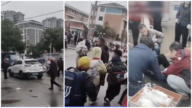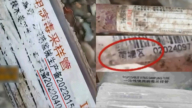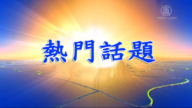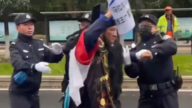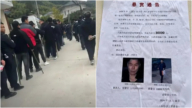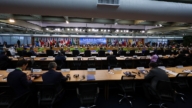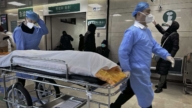【新唐人2012年1月18日訊】1月16號,北京舉行紀念尼克松訪華40週年晚宴。中共國家副主席習近平在致辭時表示,中美兩國應該「密切合作」。在中美關係備受人民幣匯率、南海等問題困擾的時刻,習近平的這番講話,被外界認為是在向美國示好。下面請看本臺記者的報導。
紀念尼克松訪華40週年晚宴上,中共國家副主席習近平說,中美兩國應該更加緊密合作,化解國際危機,決不能讓兩國關係再次出現重大干擾和挫折。
對此,美國《路透社》分析指出,習近平的講話是在向美國示好,中方希望保持與美國的平穩關係,這將有利於習近平近期的訪美和中共高層今年的18大交接班。
大陸自由撰稿人、原河北人民廣播電臺編輯朱欣欣對《新唐人》表示,雖然中共擁有一定的經濟實力,但中共自己也知道,目前它還無法和美國抗衡。
朱欣欣:「無論是從它的現實講,還是將來講,我想中共要維持中美之間這種關係,目前(中共)宣傳的這種看法,只是出於它的現實利益來考慮的。」
英國廣播公司《BBC》中文網評論說,儘管習近平希望中美關係平穩,但兩國之間實際上面臨很多重大矛盾。中美巨大的貿易不平衡、人民幣匯率問題,在短期內仍然很難解決。在敏感的南海問題上,中美間更是衝突不斷。
針對中共在亞太地區的擴張,美國這個月初發表的《防務戰略指南》表示,美國的戰略重心將轉向亞太,強化在亞太地區的外交、經濟和軍事活動,保持亞太地區穩定。而近期緬甸政府釋放政治犯、逐步向民主轉型的趨勢,也讓中共非常惱火。
朱欣欣分析指出,美國是個基督教國家,信奉有神論,在執政理念上,首先要堅持真理。而中共作為一個類似「偽宗教」的無神論組織,奉行利益至上的「機會主義」。二者在意識形態上、價值觀上是絕對對立的。
朱欣欣:「習近平講:現在無論怎麼變化,我們都要和美國友好,搞好關係。這只是一種外交辭令。從長遠來講,只要是共產黨在中國佔統治地位,中美兩國之間的關係,從根本上是對立的,總會摩擦不斷。」
據報導,美國前國務卿基辛格也出席了這次晚宴。他曾經陪同美國總統尼克松在1972年2月訪問中國。而尼克松的這次訪華,被認為結束了兩國的相互隔絕狀態,因此也被稱為「破冰之旅」。
朱欣欣:「人們對文化大革命,從剛開始的狂熱到後來的懷疑,直到林彪事件,毛澤東這種偶像崇拜的地位受到極大的打擊。在國內,它﹙中共﹚面臨很大的危機。國際上來講,中蘇關係越來越緊張,所以它﹙中共﹚利用美國來抗衡蘇聯。」
目前外界普遍認為,中共國家副主席習近平,很有可能會在中共18大上接替胡錦濤,成為中共總書記。17號,中共外交部發言人證實,習近平將在近期內出訪美國。這被認為是中共新任領導人接班前的慣例。
新唐人記者秦雪、李謙、郭敬採訪報導。
40th Anniversary of President Nixon’s Visit to China:
Looking back and Looking forward
On Jan.16, Beijing held a dinner party to commemorate the
40th anniversary of Richard Nixon’s visit to China.
Chinese Vice Chairman Xi Jinping said the two countries
should be “cooperating closely".
Sino-US relations currently have problems on the issues of
the RMB exchange rate, the South Sea and other problems at the moment.
Xi’s speech has been considered a friendly sign to the United
States.
At the dinner party, the Chinese Vice Chairman Xi Jinping
said that China and the U.S. should work closely to resolve
the international crisis and not allow any disruption between
the two countries.
Reuter’s interpretation of Xi’s speech was that it demonstrated
an amicable show to the U.S. The Chinese Communist Party (CCP) hopes to maintain the smooth relations.
This may be of aid to Xi Jinping’s visit to the U.S. which
is a good sign for the 18th National Congress power shift.
Writer Zhu Xinxin, former editor of the Hebei People’s
Radio Station said to NTDTV that
although the CCP has economic strength,
it knows it cannot compete with the US at present.
Zhu Xinxin: “No matter whether it is with regard to current
reality or the future,
I think the CCP wants to maintain its relationship with the U.S.
Currently, the CCP is spreading propaganda highlighting this
view, in consideration of its practical interests."
The BBC Chinese network commented that
although Xi Jinping hopes that Sino-US relations are stable,
the two countries are face many contradictions.
For example, there is a huge trading imbalance
between the two countries.
The RMB exchange rate also raises some issues.
In the short term, these problems are difficult to solve.
On the sensitive issue of the South Sea, both countries have
consistently conflicting views.
With regard to the CCP’s expansion in the Asia-Pacific
region, the U.S. published a “Defense Strategy Guide" earlier,
which highlighted that the U.S. strategic focus
will turn to the Asia-Pacific,
to strengthen their diplomacy, economy, military activities
and to maintain stability.
Recently, the Myanmar government have released
their political prisoners.
This trend of shifting to democracy has also
aggravated the CCP.
Zhu Xinxin’s analysis of the U.S. highlights that is a Christian
country, upholding the principle of truth in its political administration.
The CCP, as a pseudo-religious yet atheistic organization,
follows opportunism. Thus, they are sharply divided in ideology.
Zhu Xinxin: “Xi said, the CCP will maintain friendly relations
with U.S. despite changes.
This is nothing but a diplomatic strategy.
As long as CCP rules China, it will be fundamentally
antagonistic to the U.S.”
Reports state former U.S. Secretary of State, Henry Kissinger
Also attended the dinner.
Kissinger accompanied President Nixon to visit China
in February, 1972.
This visit was considered an “ice-breaking trip”,
ending the segregation between the two countries.
Zhu Xinxin: “From the people’s frenzy at the beginning of
Cultural Revolution,
to their subsequent suspicion and the Lin Biao incident,
the idolatry surrounding Mao had been greatly undermined.
At home, the CCP faced internal crises; internationally, Sino-
Soviet relations worsened.
Thus, CCP made use of the U.S. to counter the Soviet Union.”
It is now widely believed that Chinese Vice Chairman Xi Jinping
is to succeed Hu Jintao at the CCP’s 18th National Congress.
Jan. 17, Chinese Foreign Ministry spokesman confirmed that
Xi Jinping will visit U.S. in the near future,
which is now considered customary practice for
China’s future presidents.
NTD Reporters Qin Xue, Li Qian and Guo Jing


